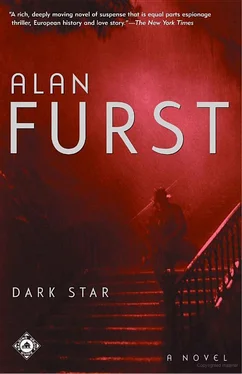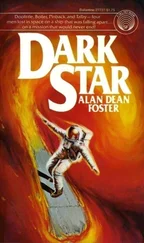Alan Furst - Dark Star
Здесь есть возможность читать онлайн «Alan Furst - Dark Star» весь текст электронной книги совершенно бесплатно (целиком полную версию без сокращений). В некоторых случаях можно слушать аудио, скачать через торрент в формате fb2 и присутствует краткое содержание. Жанр: Шпионский детектив, на английском языке. Описание произведения, (предисловие) а так же отзывы посетителей доступны на портале библиотеки ЛибКат.
- Название:Dark Star
- Автор:
- Жанр:
- Год:неизвестен
- ISBN:нет данных
- Рейтинг книги:3 / 5. Голосов: 1
-
Избранное:Добавить в избранное
- Отзывы:
-
Ваша оценка:
- 60
- 1
- 2
- 3
- 4
- 5
Dark Star: краткое содержание, описание и аннотация
Предлагаем к чтению аннотацию, описание, краткое содержание или предисловие (зависит от того, что написал сам автор книги «Dark Star»). Если вы не нашли необходимую информацию о книге — напишите в комментариях, мы постараемся отыскать её.
Dark Star — читать онлайн бесплатно полную книгу (весь текст) целиком
Ниже представлен текст книги, разбитый по страницам. Система сохранения места последней прочитанной страницы, позволяет с удобством читать онлайн бесплатно книгу «Dark Star», без необходимости каждый раз заново искать на чём Вы остановились. Поставьте закладку, и сможете в любой момент перейти на страницу, на которой закончили чтение.
Интервал:
Закладка:
Along with the purge, the phrase spread everywhere; it was scrawled on the walls of cells, carved in the wooden benches of the Stolypin wagons that hauled prisoners away, scratched into planks in transit camps. Almost always the first words spoken to the police who came in the night, then again the first words of a man or a woman entering a crowded cell. “But why? Why?”
We are all alike, Szara thought. We don’t offer excuses or alibis, we don’t fight with the police, we don’t look for compassion, we don’t even plead. We are the people who called ourselves “dead men on furlough;” we always expected to die-in the revolution, the civil war. All we ask, rational men that we are, is to see the sense of the thing, its meaning. Then we’ll go. Just an explanation. Too much to ask?
Yes.
The savagery of the purge, Szara knew, gave them every reason to believe there was, must be, a reason. When a certain NKVD officer was taken away, his wife wept. So she was accused of resisting arrest. Such events, common, daily, implied a scheme, an underlying plan. They wanted only to be let in on it-certainly their own deaths bought them the right to an answer-and then they’d simply let the rest of it happen. What was one more trickle of blood on a stone floor to those who’d seen it flow in streams across the dusty streets of a nation? The only insult was ignorance, a thing they’d never tolerated, a thing they couldn’t bear now.
In time, the cult of Za chto began to evolve a theory. Particularly with the events of June 1937, when the only remaining alternative to the rule of the dictator was ripped to shreds. That June came the turn of the Red Army and, when the smoke cleared, it was seen to be headless, though still walking around. Marshal Tukachevsky, acknowledged as Russia’s greatest soldier, was joined in his disappearance by two of four remaining marshals, fourteen of sixteen military commanders, eight of eight admirals, sixty of sixty-seven corps commanders, on and on and on. All eleven vice-commissars of defense, seventy-five of the eighty members of the Supreme Military Soviet. All of this, they reasoned; the shootings, the icebound mining camps, an army virtually destroyed by its own country- could have only one intention: Stalin simply sought to remove any potential opposition to his own rule. That was the way of tyrants: first eliminate enemies, then friends. This was an exercise in consolidation. On a rather grand scale, ultimately counted in millions- but what was Russia if not a grand scale?
What was Russia, if not a place where one could say, down through the centuries, times and men are evil, and so we bleed. This, for some, concluded the matter. The Old Bolsheviks, the Chekists, the officer corps of the Red Army-these people were the revolution but now had to be sacrificed so that the Great Leader could stand unthreatened and supreme. Russia’s back was broken, her spirit drained, but at least for most the question had been answered and they could get on with the trivial business of execution with acceptance and understanding. A final gesture on behalf of the party.
But they were wrong, it wasn’t quite that simple.
There were some who understood that, not many, only a few, and soon enough they died and, in time, so did their executioners, and, later, theirs.
The following day, Szara did not see Kuscinas. Then, when the Kolstroi steamed up the Gulf of Finland, the first ice of the season pinging against the hull, the lights of the fortress at Kronstadt twinkling in the darkness, the security men and sailors began a frantic search, combing the ship, but Kuscinas had gone, and they could not find him.
8,Rue Delesseux
“Andre Aronovich! Over here!”
An urgent female voice, cutting through the uproar of a densely packed crowd in the living room of an apartment in the Mochovaya district. Szara peered through the smoke and saw a hand waving at him. “Pardon,” he said. “So sorry. Excuse me.” He chose an indirect route toward the hand and voice, swinging wide to avoid the dangerous elbows of those who had managed to break through to the buffet. Moscow was ravaged by shortages of nearly everything, but here there was black Servuga, grilled lamb, pirozhki, salted peas, stacks of warm blini, and platters of smoked salmon. What you had, then, was desperation: a roomful of apparatchiks, mandarins of agriculture and road planning, timber and foreign policy, as well as the security services, trying to feed themselves for the week to come. More than one pocket was stuffed with meat, smoked fish, even butter-whatever one could swipe.
For an instant, Szara caught sight of a vaguely familiar face that appeared over the shoulder of a naval officer, then vanished in the crowd. A sophisticated woman, lightly made up, with simple but stylishly managed hair and dangling silver earrings.
He figured it out just about the time they found each other: a curiously altered Renate Braun, wearing a full blouse of lime-colored silk and the modestly coquettish smile one saw in British films of cocktail parties. “Heavens, what a crowd!” she said, brushing his cheek with hers-a dear friend one simply doesn’t see often enough. Last seen slicing up a dead man’s pants cuffs with a razor blade in an Ostend whorehouse, here was an entirely different version of the woman.
“You must meet Mr. Herbert Hull,” she gushed, speaking in German-accented English.
Now Szara noticed that she had in tow a tall, sandy-haired man with a weather-beaten face and wildly overgrown eyebrows. He was perhaps in his late forties and, from his casual, loose-jointed posture, evidently American. He was smoking, with difficulty, a poorly rolled makhorka cigarette, a self-conscious attempt to be part of the local scenery, Szara thought. “Herb Hull,” he said. He had a powerful grip and sought something in Szara’s eyes when they shook hands.
“Herb has been so anxious to meet you,” Renate Braun said.
“We all know Andre Szara,” Hull said. “I’m a great fan of your work, Mr. Szara.”
“Oh but you must call him Andre.”
“Yes. Please.”
Szara’s English was at best uncertain. He was going to sound awful, hesitant and somehow importunate-an impression often created when Slavs spoke English. He already felt a hatefully ingratiating smile creeping over his face.
“Herb’s an editor with a new American magazine. A very important undertaking. You’ll know him, of course, from when he was with the Nation and the New Republic.”
“Ah yes.” Szara knew the names, prayed he wouldn’t be questioned about specific articles. The anxious smile grew. “Of course. Importantly.”
Szara saw Renate Braun wince, but plunged ahead. “You are liking Russia?”
“Never the same place two days in a row, things go wrong, but there’s a strength in the people that’s irresistible.”
“Ach!”-mock horror from Renate Braun-“he knows us too well.”
Hull smiled and shrugged. “Trying to learn, at any rate. That’s what we need. Firsthand knowledge, a feel for the real Russia.”
“I am certain that Andre can help you with that, Herb. Positive.”
“Yes?” Szara said.
“Why not?” Hull’s eyebrows rose. “After all, I’m an editor, you’re a writer. For a new magazine, well, a Russian writer speaking about the USSR would be a change, change for the better I’m inclined to think. No?”
“Ah, but my English.”
“No problem, Andre. We’d be happy to do the translation, or it could be done here. Won’t be perfect, but we’ll guarantee to preserve the sense of it.”
“I am honored,” Szara said. He was. The thought of appearing in a respected journal before an American audience, not the usual Daily Worker crowd, was immensely pleasing. Ilya Ehrenburg, Pravda’s number one correspondent, had done it, occupying the journalistic territory in the Spanish Civil War so effectively that Szara was virtually restricted to other parts of Europe.
Читать дальшеИнтервал:
Закладка:
Похожие книги на «Dark Star»
Представляем Вашему вниманию похожие книги на «Dark Star» списком для выбора. Мы отобрали схожую по названию и смыслу литературу в надежде предоставить читателям больше вариантов отыскать новые, интересные, ещё непрочитанные произведения.
Обсуждение, отзывы о книге «Dark Star» и просто собственные мнения читателей. Оставьте ваши комментарии, напишите, что Вы думаете о произведении, его смысле или главных героях. Укажите что конкретно понравилось, а что нет, и почему Вы так считаете.












